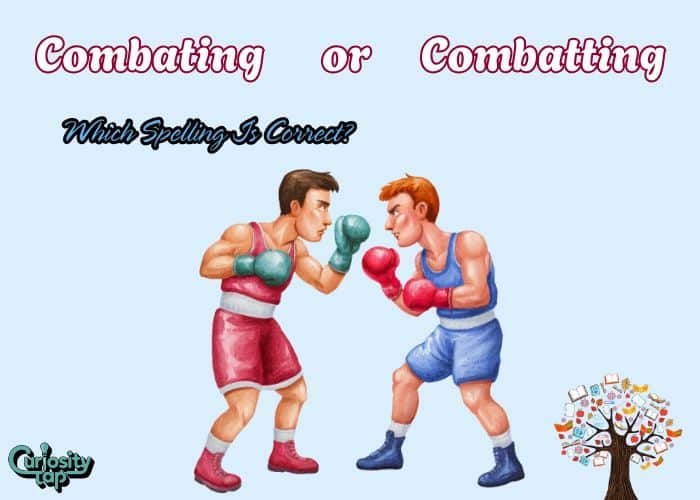English spelling can be tricky, especially when words look almost identical but only one is widely accepted.
A common question many learners and even native speakers face is: “Should I write combating or combatting?”
This article clears up the confusion, explains the rule behind the spellings, and shows you how to confidently use the correct form in everyday writing.
The Correct Spelling: Combating
The standard and widely accepted spelling in modern English is combating.
Whether you’re writing an essay, news report, or professional email, combating is the form recognized by major dictionaries such as Merriam-Webster and Oxford English Dictionary.
Why not Combatting?
The form combatting occasionally appears, but it is considered a misspelling in most contexts.
It stems from a misunderstanding of how doubling consonants works when adding suffixes in English.
Understanding the Rule Behind the Spellings
1. The Rule of Consonant Doubling
In English, when a one-syllable verb ends with a vowel + consonant (like run → running), the final consonant is doubled before adding -ing.
- run → running
- sit → sitting
However, combat has two syllables (com-bat), and the stress falls on the first syllable, not the last. This means the final consonant “t” does not get doubled.
➡️ Correct: combating
❌ Incorrect: combatting
2. Regional Spelling Differences
Unlike some words that vary between American and British English (traveled vs travelled), combating is the correct form in both versions of English.
Real-Life Example: The Media and Government Usage
Consider how global organizations and government agencies use the word:
- The World Health Organization (WHO) often publishes reports on combating diseases such as malaria and tuberculosis.
- The U.S. Department of Defense frequently uses the phrase combating terrorism in official documents.
In both cases, the authoritative choice is combating, not combatting.
This shows that in formal, professional, and academic contexts, the standard spelling carries credibility. Using combatting may make your writing look less polished.
Also Read:
Cacoon or Cocoon: Correct Spelling & Usage Explained
Company-wide or Companywide: Hyphen Rule Explained
Mine as Well, Might as Well, or Mind as Well? Which Is Correct?
Impatient vs Inpatient: Key Differences Explained
Pre vs Post: Which Prefix To Use?
When You Might See Combatting
While combatting is not standard, you may occasionally encounter it in:
- Informal blogs or social media posts, where spelling rules are often relaxed.
- Older texts, as historical variations sometimes persist in archives or manuscripts.
But if your goal is clear and professional writing, stick with combating.
Quick Checklist: Choosing the Right Form
| Rule/Context | Correct Form | Notes |
|---|---|---|
| Formal writing (academic, professional) | combating | Always standard |
| Dictionaries & style guides | combating | Universally listed |
| American English | combating | No regional variation |
| British English | combating | Same as American |
| Informal/mistaken spelling | combatting | Avoid in formal work |
Pros and Cons of Each Form
Combating (Correct Form)
Pros:
- Universally accepted spelling
- Matches grammar and phonetic rules
- Used in professional and academic contexts
Cons:
- Learners sometimes confuse it due to words like sitting or running
Combatting (Incorrect Form)
Pros:
- Occasionally seen, so not entirely unfamiliar
- Looks “logical” to learners applying doubling rules incorrectly
Cons:
- Not recognized in dictionaries
- Can weaken credibility in formal writing
- Marked as an error in spell-check tools
FAQs About Combating vs Combatting
Is combatting ever correct?
No. Mainstream dictionaries and grammar guides list combating as the only correct spelling.
Why do some people write combatting?
It’s a common mistake caused by over-applying the consonant doubling rule from words like running or sitting.
Do British and American English differ here?
No. Both forms of English use combating.
Can I use combatting in informal writing?
You could, but it’s considered a spelling error and may affect how your writing is perceived.
What about related words like combatant?
These follow their own rules. For example, combatant is correct and doesn’t change the base spelling.
Does spelling affect SEO or online content?
Yes. Since combating is the standard spelling, search engines recognize it as correct. Using combatting could reduce visibility.
Conclusion
When it comes to combating or combatting, there’s no debate: combating is the correct and professional choice.
By understanding the rules of consonant doubling, you can avoid common spelling pitfalls and strengthen your writing credibility.
✅ Always choose combating in academic, professional, and online writing.
Call to Action
Want to sharpen your English and write successfully every time?
Check out our Grammar Checker Tool and never second-guess your spelling again!
Read our guide on Common English Misspellings to boost your skills even further.
Sources List
Sources:
- Merriam-Webster Dictionary. (2025). Combating. Retrieved from: https://www.merriam-webster.com
- Oxford English Dictionary. (2025). Combating. Retrieved from: https://www.oed.com
- U.S. Department of Defense. (2024). Combating Terrorism Strategy. Retrieved from: https://www.defense.gov
Read more knowledgeable blogs on Curiosity Tap
Is this article helpful?

Jackson Pearson is a passionate educator and language enthusiast behind the blog Jackson Pearson. With years of experience in teaching and writing, he specializes in simplifying complex grammar rules, breaking down tricky vocabulary, and crafting learning guides that are both engaging and practical. His mission is to help readers boost their English skills whether they’re beginners or brushing up for fluency. Through every article, Jackson brings clarity, structure, and a spark of curiosity to the world of English learning.



